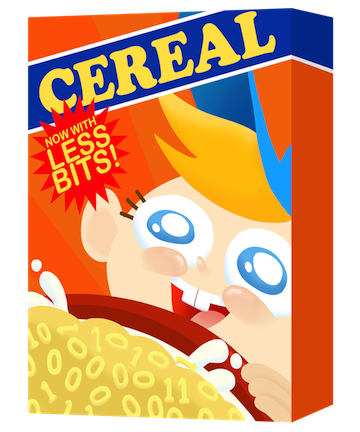mirror of
https://github.com/RPCS3/cereal.git
synced 2024-12-05 01:36:24 +00:00
A C++11 library for serialization
-Make CEREAL_THREAD_SAFE be 0 or 1 instead of present or not present -Move CEREAL_NOEXCEPT to macros.hpp -instead of individual locks, can now use StaticObject::lock() to request a lock if CEREAL_THREAD_SAFE is enabled. If not enabled, this call returns an empty object. The lock returned acts just like std::lock_guard, but uses std::unique_lock internally -Made a bunch of requests to StaticObject::getInstance const -Added first stab at multithreaded tests with versioning and polymorphism |
||
|---|---|---|
| doc | ||
| include/cereal | ||
| sandbox | ||
| scripts | ||
| unittests | ||
| vs2013 | ||
| .gitignore | ||
| .travis.yml | ||
| CMakeLists.txt | ||
| LICENSE | ||
| README.md | ||
cereal - A C++11 library for serialization

cereal is a header-only C++11 serialization library. cereal takes arbitrary data types and reversibly turns them into different representations, such as compact binary encodings, XML, or JSON. cereal was designed to be fast, light-weight, and easy to extend - it has no external dependencies and can be easily bundled with other code or used standalone.
cereal has great documentation
Looking for more information on how cereal works and its documentation? Visit cereal's web page to get the latest information.
cereal is easy to use
Installation and use of of cereal is fully documented on the main web page, but this is a quick and dirty version:
- Download cereal and place the headers somewhere your code can see them
- Write serialization functions for your custom types or use the built in support for the standard library cereal provides
- Use the serialization archives to load and save data
#include <cereal/types/unordered_map.hpp>
#include <cereal/types/memory.hpp>
#include <cereal/archives/binary.hpp>
#include <fstream>
struct MyRecord
{
uint8_t x, y;
float z;
template <class Archive>
void serialize( Archive & ar )
{
ar( x, y, z );
}
};
struct SomeData
{
int32_t id;
std::shared_ptr<std::unordered_map<uint32_t, MyRecord>> data;
template <class Archive>
void save( Archive & ar ) const
{
ar( data );
}
template <class Archive>
void load( Archive & ar )
{
static int32_t idGen = 0;
id = idGen++;
ar( data );
}
};
int main()
{
std::ofstream os("out.cereal", std::ios::binary);
cereal::BinaryOutputArchive archive( os );
SomeData myData;
archive( myData );
return 0;
}
cereal has a mailing list
Either get in touch over email or on the web.
cereal has a permissive license
cereal is licensed under the BSD license.
cereal build status
Were you looking for the Haskell cereal? Go here.
